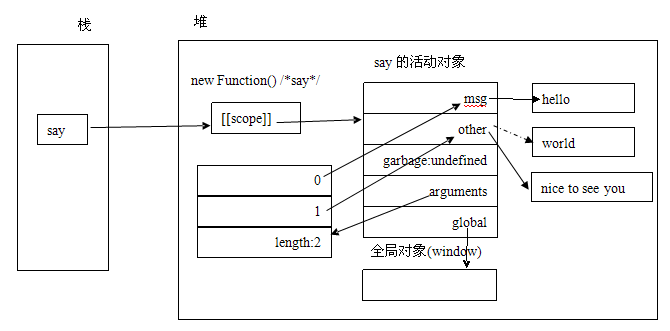时间:2021-07-01 10:21:17 帮助过:7人阅读
输出为hello,而不是undefined呢?函数定义的参数和函数内部定义的变量重复了会发生什么呢?arguments和函数定义时的参数有什么关系呢?让我们来一一解答:
function say(msg,other,garbage){
alert(arguments[1]);//world
var other = 'nice to meet you!';
var msg;
alert(arguments.length);
alert(msg);//hello
alert(other);//nice to meet you!
alert(arguments[1]);//nice to meet you!
alert(garbage);//undefined
}
say('hello','world');
你能正确的解释代码的执行结果吗?思考一下.
我想代码运行的结果,应该会和你的想象有很大的出入吧!为什么msg正常

function say(msg,other,garbage){
//先对函数声明的变量进行'预解析',内部执行流程,它是是不可见的
var msg = undefined;
var other = undefined;
var garbage = undefined;
//再对函数内部定义的变量进行'预解析'
var other = undefined;//很明显,此时这个定义已经无意义了。
var msg = undefined;//无意义
//对实际参数进行赋值操作
msg = new String('hello');//arguments的会将所有实际参数当作对象看待
other = new String('world');
//正式进入函数代码部分
alert(arguments[1]);//world
other = 'nice to meet you!';
//var msg;这个已经被预解析了,因此不会再执行
alert(arguments.length);//2
alert(msg);//hello
alert(other);//nice to meet you!
alert(arguments[1]);//nice to meet you!
alert(garbage);//undefined
}
这段代码已经可以解释一面的所有的问题了。我就不多说了。
唯一强调的一点是在内部用var定义与形式参数同名的变量是无意义的,因为在程序'预解析'后,会将它们看作为同一个变量。
其它
关于arguments还有很多特性,我在《伪数组》一文中提到也提到了arguments,有兴趣的读者可以去看一下。arguments的实际应用你还可以参考一下这一篇文章 :
http://www.gracecode.com/archives/2551/
好了,也就这么多了。希望大家能多多指正,多提意见吧。